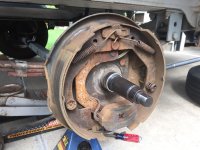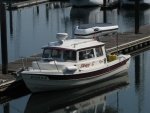thataway
Well-known member
- Joined
- Nov 2, 2003
- Messages
- 21,692
- Reaction score
- 65
- C Dory Year
- 2007
- C Dory Model
- 25 Cruiser
- Hull Identification Number
- DOR25652A707
- Vessel Name
- thataway
Thanks Dave!
Colby, I don't believe that Dave has an equalizing hitch. I also was curious about the weight on the front axel and rear axle. I have maintained that most pickups are "light" in the rear--and that is one of my arguments for a SUV, vs a pickup. The SUV has windows, and a full frame over the roof etc aft--vs the pickup just the body, and a shell, in Dave's case.
I just happened to have my Yukon XL weighed also on a "Cat" scale this week. When the trailer was hooked up:
Front axle was2900 lb
Drive axle was 3120 lb
unloadedTrailer was 880 lb
Gross weight 6900
Without trailer:
Front Axle 3000 lbs'
Drive Axle 2820
Trailer 00000
Gross weight 5820
Trailer weight 1080 lbs and tongue weight 300 lbs.
There is a little weight shift from the front axle with the trailer on the rear.
I do have the heavy duty towing package as well as 4 x 4, 2 range/neutral transfer case (No weight equalizing) But there was only a few lbs in the Yukon XL (tools etc). I was out of the truck during both weighs.
Dave's weight is with a 23, which we know is heavier than the 22, but with the cruising gear which they use for several months. I don't see the weights being out of line at all--Dave has a heavier truck, beefier suspension and I believe a diesel--plus perhaps people in the truck, as well as personal gear.
I don't have a problem with non stainless caliper and non stainless brake hydraulic lines. I can inspect the lines every time I tow, and at my stops--where I do IR temps on hubs and disc brake rotor, I wash down, and use a corrosion block spray on the lines regularly--never had corrosion problem with lines in the past over many years of trailering boats. I also feel better putting on my own lines and brakes (I had a tire shop damage a line which had been routed under an axle by the factory!) I lube the hubs before each long haul, and since I carry an impact & torque wrench, it is no problem to pull the wheels, and look directly at calipers when I am doing the inspection. This way I am sure they are working properly. Also with the E/H brakes, it is very easy to energize the brakes, and actually watch the caliper using the battery and emergency "stop".
Colby, I don't believe that Dave has an equalizing hitch. I also was curious about the weight on the front axel and rear axle. I have maintained that most pickups are "light" in the rear--and that is one of my arguments for a SUV, vs a pickup. The SUV has windows, and a full frame over the roof etc aft--vs the pickup just the body, and a shell, in Dave's case.
I just happened to have my Yukon XL weighed also on a "Cat" scale this week. When the trailer was hooked up:
Front axle was2900 lb
Drive axle was 3120 lb
unloadedTrailer was 880 lb
Gross weight 6900
Without trailer:
Front Axle 3000 lbs'
Drive Axle 2820
Trailer 00000
Gross weight 5820
Trailer weight 1080 lbs and tongue weight 300 lbs.
There is a little weight shift from the front axle with the trailer on the rear.
I do have the heavy duty towing package as well as 4 x 4, 2 range/neutral transfer case (No weight equalizing) But there was only a few lbs in the Yukon XL (tools etc). I was out of the truck during both weighs.
Dave's weight is with a 23, which we know is heavier than the 22, but with the cruising gear which they use for several months. I don't see the weights being out of line at all--Dave has a heavier truck, beefier suspension and I believe a diesel--plus perhaps people in the truck, as well as personal gear.
I don't have a problem with non stainless caliper and non stainless brake hydraulic lines. I can inspect the lines every time I tow, and at my stops--where I do IR temps on hubs and disc brake rotor, I wash down, and use a corrosion block spray on the lines regularly--never had corrosion problem with lines in the past over many years of trailering boats. I also feel better putting on my own lines and brakes (I had a tire shop damage a line which had been routed under an axle by the factory!) I lube the hubs before each long haul, and since I carry an impact & torque wrench, it is no problem to pull the wheels, and look directly at calipers when I am doing the inspection. This way I am sure they are working properly. Also with the E/H brakes, it is very easy to energize the brakes, and actually watch the caliper using the battery and emergency "stop".


